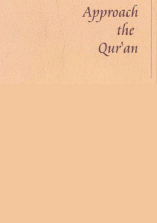Approach the Quran

Positive Response
As one reads and ponders on the Glorious Qur'an, one must respond positively to what he reads. Meaning should be reflected upon and grasped, and then one should react accordingly. Should he read Qur'anic verses speaking about Allah's mercy, he must ask Allah to forgive and bestow His mercy upon him. In case he reads verses dealing with torment or punishment, he should seek refuge in Allah from it. When reading verses that shed light on Allah's Glory, Names, and Attributes, he should glorify and praise Him, Most High.
In this context, we recall the narration of Hudhayfah (may Allah be pleased with him) who reported, "I prayed with the Messenger of Allah (peace be upon him) one night and he started reciting swat Al-Baqarah. I thought that he would bow at the end of one hundred verses, but he proceeded; I then thought that he would perhaps recite the whole (sarah) in a rak`ah, but he proceeded and I thought he would perhaps bow on completing (this sarah). He then started reading surat An-Nisa', and recited it; he then started Al `Imran and recited it. He recited leisurely. And when he recited the verses which referred to the Glory of Allah, he glorified (by saying Subhana Allah - Glory be to my Lord, the Great), and when he recited the verses which tell (how the Lord) is to be begged, he (the Prophet) would then beg (from Him), and when he recited the verses dealing with seeking refuge in Allah, he sought refuge in Him..."[1]
`Awf ibn Malik, likewise, reported, "One night, I prayed with the Prophet (peace be upon him) when he recited sara:
Al-Baqarah. He beseeched Allah's Mercy whenever he read verses speaking about Allah's Mercy, and sought refuge in Allah whenever he read verses dealing with punishment or torment.[2]
Ibn `Abbas (may Allah be pleased with them both) reported that whenever the Prophet (peace be upon him) read: (Glorify the Name of thy Guardian Lord, Most High) [3] he used to say. "Glory be to my Lord, Most High." [4]
In his Al-Burhan fi `Ulum Al-Qur'an, Imam Az-Zarkashi said that learning the Glorious Qur'an is an unparalleled gift, for it is the Divine, endless miracle of Islam, which was revealed to the seal of the Prophets (peace be upon them all). It is the Word of Allah, the Lord of the worlds. Therefore, one who is gifted with learning the Qur'an should believe that he is greatly favored by Allah, Most High. Therefore, it is his duty to make the Glorious Qur'an a proof on his behalf through abiding by its instructions which will be manifested in doing good and steering clear of all forms of evil. Good recitation of the Glorious Qur'an, in fact, helps man fulfill this duty. In the Glorious Qur'an, Allah, Most High, addresses His Prophet (peace be upon him), saying,
(And recite the Qur'an in slow, measured rhythmic tones.)
(Al-Muzzammil: 4)
((It is) a Qur'an, which we have divided (into parts from time to time), in order that thou mightiest recite it to men at intervals: We have revealed it by stages.)
(Al-Isra': 106)
A reciter of the Glorious Qur'an should reflect upon what he reads, and grasp the meaning of each verse to the extent that he does not pass from one verse to another verse until he becomes himself well-acquainted with its meaning. When he reads, for example, the call: (O you who believe) he should focus his attention on it and ponder on what comes after it of commands, prohibitions, admonitions, etc. On reading the above call, some righteous men used to say: Here I am, O Lord, at your service. Thus, if he reads a verse containing a command that he did not carry out in the past, he should ask Allah for forgiveness. Should he, for instance, read the verse that reads: (O ye who believe! Turn to Allah with sincere repentance) [5] he has to think of his sins and consequently ask Allah to forgive him and to redeem himself of others' dues if there are any. ln this way, he will be regarded as a believer who listens to and obeys His Lord.
If one reads a Qur'anic verse and does not know its meaning, he is recommended to memorize it until he asks a scholar about its meaning. If he reads Qur'anic verses dealing with the destruction of previous nations, he should ponder on their affair and express his gratitude to Allah for His favor on this Urnmah. lf he reads a command or prohibition, he should intend to abide by it. If he reads Mutashabihat[6] verses, he has to confirm his belief in them in correspondence to Allah's command in the verse that reads,
(He it is who has sent down to thee the book: in it are verses basic or fundamental (of established meaning); they are the foundation of the book: others are allegorical. But those in whose hearts is perversity follow the part thereof that is allegorical, seeking discord, and searching for its hidden meanings, but no one knows its hidden meanings except God. And those who are firmly grounded in knowledge say: We believe in the book; the whole of it is from our Lord: and none will grasp the message except men of understanding.
(Al `lmran: 7)
[1] Reported by Muslim.
[2] Reported by Abu Dawud.
[3] Surat Al-A`la: l.
[4] Reported by Ahmad and Abu Dawud.
[5] Surat At-Tahrim: 8.
[6] According to the Quran, the Qur'anic verses are divided into Muhkant (clear in meaning) and Mntashabihat (unclear verses). (Trans.)
